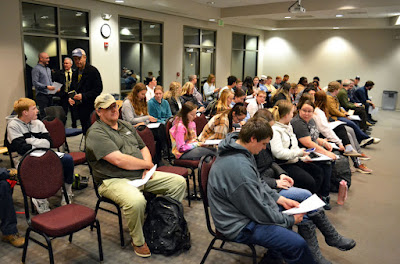 |
| Crowd ready to listen to Dr. Travis Lacy speak. I helped carry in extra chairs, and yes, I wore my mask. Most popular event of this year's MMU Fall Faculty Series. |
 |
| Dr. Travis Lacy, assistant professor of religious studies, speaks. |
"So when at times the mob is swayed
To carry praise or blame too far
We may choose something like a star
To stay our minds and be staid."
Quote from "Choose Something Like a Star" by Robert Frost, quoted by in a presentation by Dr. Travis Lacy.
I live in the modern world, too, even if I learned to keyboard on a manual typewriter and didn’t own my first computer until the 1980s were almost the 1990s. So, like many who live now on the planet, I exist in a zone that includes both the actual reality around me and the virtual reality that beckons like a siren.
Does social media make me sadder? Probably. Am I addicted to what Dr. Travis Lacy, assistant professor of religious studies at Mount Mercy University, noted is a “hit of dopamine” we get from “likes” on social media?
I’m not sure that something that is habitual is an actual addiction, in a psychological or medical sense, but it’s something like that. And yes—I write three blogs that have fairly low readership, but if someone responds to what I write, or even just likes the link or image that I post on Facebook, it does make me feel better.
Of course, I think there is more going on. I think writing, for me, is more than just a habit or a means to get the next hit of positive brain chemistry—it’s the muscle I used for years to earn my living and that now I do for the pleasure of creation. It’s brain therapy, too—it keeps my most important organ, the one between my ears, a bit more in tone.
Ironically, to me, thus what I post on social media is partly the antidote to social media—I am ruminating on my life, processing my experience, connecting, in an introvert’s lonely way, to reality. Not just running from it. Author (and social media creator) John Green recently talked about the value of creating online:
But I do use my smart phone to “kill time,” as Lacy called it. Dr. Lacy spoke Nov. 15, giving the final presentation in a fall faculty series at Mount Mercy University on “Humans and Machines” in a provocative discourse that he entitled “Scrolling is Unpaid Labor.” The thing that we do when we feel private and alone on our phones or tablets is not as alone as we think—it’s an act that is recorded, watched and commodified.
Our attention is a product that we produce. And advertisers pay, according to data cited by Dr. Lacy, more than $500 billion a year to catch some of that digital audience's attention. Oddly, as he noted, online ads are weirdly different from classic advertising, in that most of us don’t recall much of those ads we see on Instagram or Facebook or YouTube—and an impression that funds the marketing marketplace of cyber commerce is defined as half of a screen being on our device or at least a second.
 |
| Dr. Travis Lacy makes a point. |
True, ads exist to motivate consumers. True, that is not a new concept, in our culture, as the main system that funds American media—both news and entertainment—has historically been ads. But what feels weird is the brief snippet of eyeball attention that somehow seems so disconnected from an act in the real world would be so valued.
Then again, consumers tend to define themselves as immune to ads in a way that advertisers know they’re not. If online attention were completely divorced from actual commerce, it would wither. It’s not withering.
Yet, the way social media is constructed, it’s almost insidiously rewarded for making us sad. As Dr. Lacy noted, an addict is most vulnerable when the pain of their real life demands some balm. Whether whiskey or the Meta-verse, whatever drug we turn to when we’re down can give us a brief relief, but often leaves us hollow in the long run, more divorced from our lives, more troubled in our souls.
 |
| Book title from my notes, propped against my computer screen as I write this post. "Iber Pumpon Makes You Stupid?" How dare Iber Pumpon. |
I’m not trying to recreate Dr. Lacy’s whole message here. I’ve skipped Karl Marx and his insight into labor. And I wrote down the title of a book Dr. Lacy cited, because it sounded like something I would want to read, but my handwriting is so bad that I can’t make it out. “Something Something Makes You Stupid” states the illegible ink squiggles, on my notebook’s page. The something-something in my notes looks like “Iber pumpon,” which seems a bit unlikely as a book title.
Update Nov. 20: Thanks to Dr. Lacy (and Dr. Joy Ochs) for noting the title of the book in question. It's “How PowerPoint Makes You Stupid,” by Franck Frommer. Iber Pumpon seems more like a prescription drug name than the name of slide-making software.
I tell my communication students that the act of hand writing notes helps fix memory, and I believe there is some truth there. Still, it can fail. It may help if the squiggles themselves aren’t made by an old southpaw whose handwriting was always iffy (a consistent D grade on my paper report cards in elementary school), and whose crippled index finger and arthritic hands aren’t improving his finger dexterity.
 |
| Above and below, others making notations during Dr. Lacy's speech. May their notes be more legible than mine. |
Nonetheless, while I was sitting in that room, listening to Dr. Lacy read a long script (not as bad as it sounds, speech students, as I say in class, you should learn to deliver from an outline so you can engage an audience, but if you’re experienced, you can learn to read a script and still be engaging, and Dr. Lacy has achieved that higher level of speech competence), I was connected. I was not “killing” time, but inhabiting it, living in it, enjoying it at the slower pace that the unfolding world can provide.
I don’t hate social media. I understand it’s a force that can, and often does, isolate us and make us sadder. But we each construct our own social media—my Google is not yours—and can, I believe, learn to use it to also inhabit the real world in a more healthy way. Used in reasonable doses, it’s like red wine. It would hurt us if we use it too much, but modest use is not only OK; it can even improve us.
 |
| Above and below, people listening to Dr. Lacy, not killing time on social media, but inhabiting time. |
Maybe by listening to each other. Maybe by making images, writing essays and then sharing our actual creative work.
Even if it’s unpaid labor. Because creating a full thing that you’re engaged in and care about is not labor that alienates you, it connects and grounds you.
Now, turn off your phone and go take a walk.
 |
| Key audience members, connected in reality to the speaker. And maybe social media just made you a little happier. |



